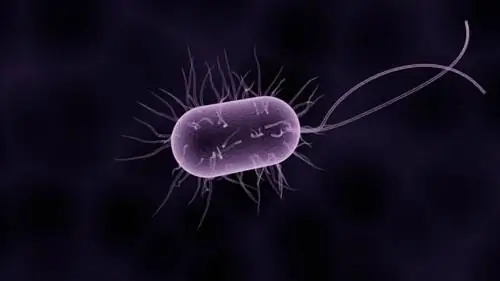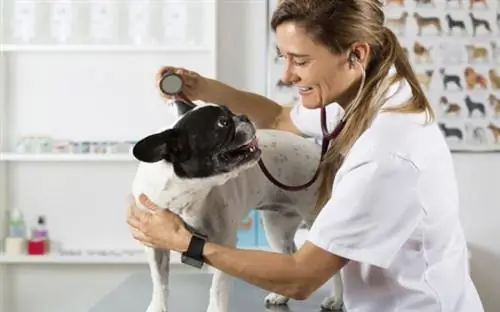- Author Carl Johnson johnson@fascinatesanimals.com.
- Public 2023-12-16 06:19.
- Last modified 2025-01-23 08:59.

Surely you have heard of pneumonia, a disease that our dogs can also suffer from. In this article on our site we are going to review its symptomatology so that you can recognize it and thus take your dog to the vet, who, as always, will be in charge of confirming the diagnosis and establish the guidelines for appropriate care and treatment
Keep reading this article on our site to learn more about pneumonia in dogs, contagion, symptoms and treatment. You can not lose this!
What is pneumonia?
Basically, pneumonia is an inflammation of the lungs, produced by many different causes, ranging from infectious agents, such as bacteria, to parasites, foreign bodies or allergens. Pneumonias are classified according to the area of the lung they affect, according to the predominant cell class, the cause and the type of reaction they cause in the lung. The veterinarian is in charge of refining the diagnosis in order to apply the most appropriate treatment.
infectious agents are often the most common cause of pneumonia in dogs. It is important to point out that viruses do not cause pneumonia, but the secondary bacterial infections associated with them do. In addition, this ailment usually affects young, geriatric animals or those with compromised immune systems due to medications or chronic diseases.

Non-infectious pneumonia
Although, as we have seen, pneumonia in dogs is usually related to infectious agents, these are not always the cause. Thus, we can find pneumonia in dogs caused by irritating substances such as smoke, inhaled food, sometimes due to swallowing defects, megaesophagus, etc., foreign bodies such as seeds, some parasites or allergens.
In this section we can highlight the aspiration pneumonia that occurs in puppies that we must feed artificially, either because they belong to to abandoned litters, either for having a mother who needs help with breastfeeding. In these cases it is very important to feed them with the bottle that can be found in the boxes of milk specially formulated for dogs.
This should be offered holding the puppy by the belly, never on its back as if it were a human baby, since in that position it is easier for ingested milk to pass into the respiratory tract. In the same way, it is dangerous to feed them with a syringe since, with it, the puppy does not suck according to what it can swallow, we are the ones who introduce the liquid, with the risk of choking that it entails and the danger of aspiration pneumonia.

Symptoms of pneumonia
Although the clinical picture will vary depending on the degree of lung involvement, the most characteristic symptoms of pneumonia in dogs are the following:
- Fever.
- Apathy, anorexia.
- Moist cough, indicating fluid in the lungs.
- Rapid breathing in more severe cases or during or after moderate exercise in less severe cases.
- Occasionally runny nose.
The appearance of any of these symptoms in our dog is reason for veterinary consultation. Your vet may use X-rays, blood tests, or bronchoscopy to make a diagnosis.
The treatment of pneumonia
Treatment of pneumonia will depend on the severity of the condition but is usually treated with antibiotics for several weeks. It will be the veterinarian who chooses the most suitable for our dog's pneumonia. Cough suppressants are not recommended because coughing helps clear the lungs, making it easier to breathe. For this same reason, mucolytics may be indicated.
Recovery will depend on the speed of treatment administration as well as the eradication of the underlying non-respiratory cause. Keep in mind that untreated severe pneumonia can lead to chronic disease or even deathof the animal.

Caring for a dog with pneumonia
The following guidelines are basic to combat pneumonia in dogs:
- Provide a warm environment.
- Offer adequate food, prioritizing the dog's preferences, since our goal is to make him eat. Thus, we can offer you cans in different textures, homemade food, etc.
- If necessary, administer fluid therapy, oral or parenteral, according to veterinary prescription.
- It is recommended to keep the airways humidified. In dry environments we can have humidifiers. We can also try to get him to inhale steam. One way would be to put it in the bathroom while we use the hot water, so that it generates steam.
- Treat the causes that predispose to the onset of pneumonia and/or avoid them as much as possible.
Of course, If it doesn't improve or it gets worse you have to go back to the vet.
Is pneumonia in dogs contagious to humans?
First of all, it must be clear that only infectious agents and parasites are capable of transmitting a disease, that is, speaking of pneumonia in dogs, only those caused byviruses, bacteria, fungi or parasites could pose a risk of contagion.
Secondly, disease-causing pathogens are often species-specific, meaning no spread is possible between animals of different species. Thus, a disease as contagious among dogs as parvovirus does not affect humans or cats, for example.
Practically all the agents involved in pneumonia in dogs are exclusive to that species. It is true that one of the bacteria that may be involved, Bordetella bronchiseptica, is found in humans, although rarely, but to date a direct relationship has not been established that would allow us to confirm that there is contagion between dogs and humans.






